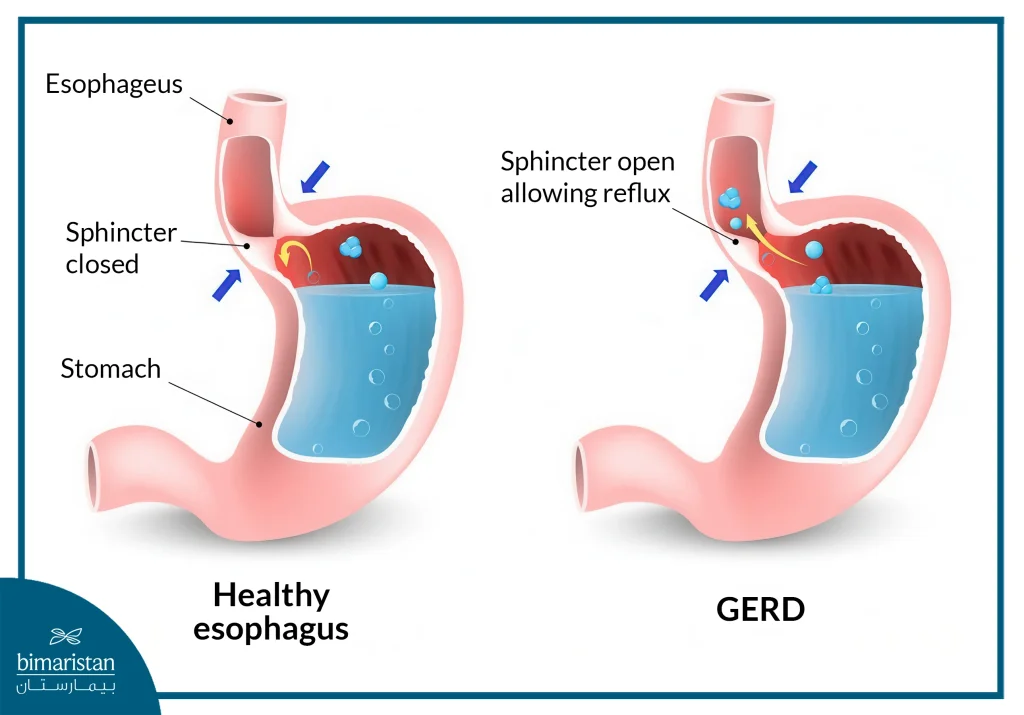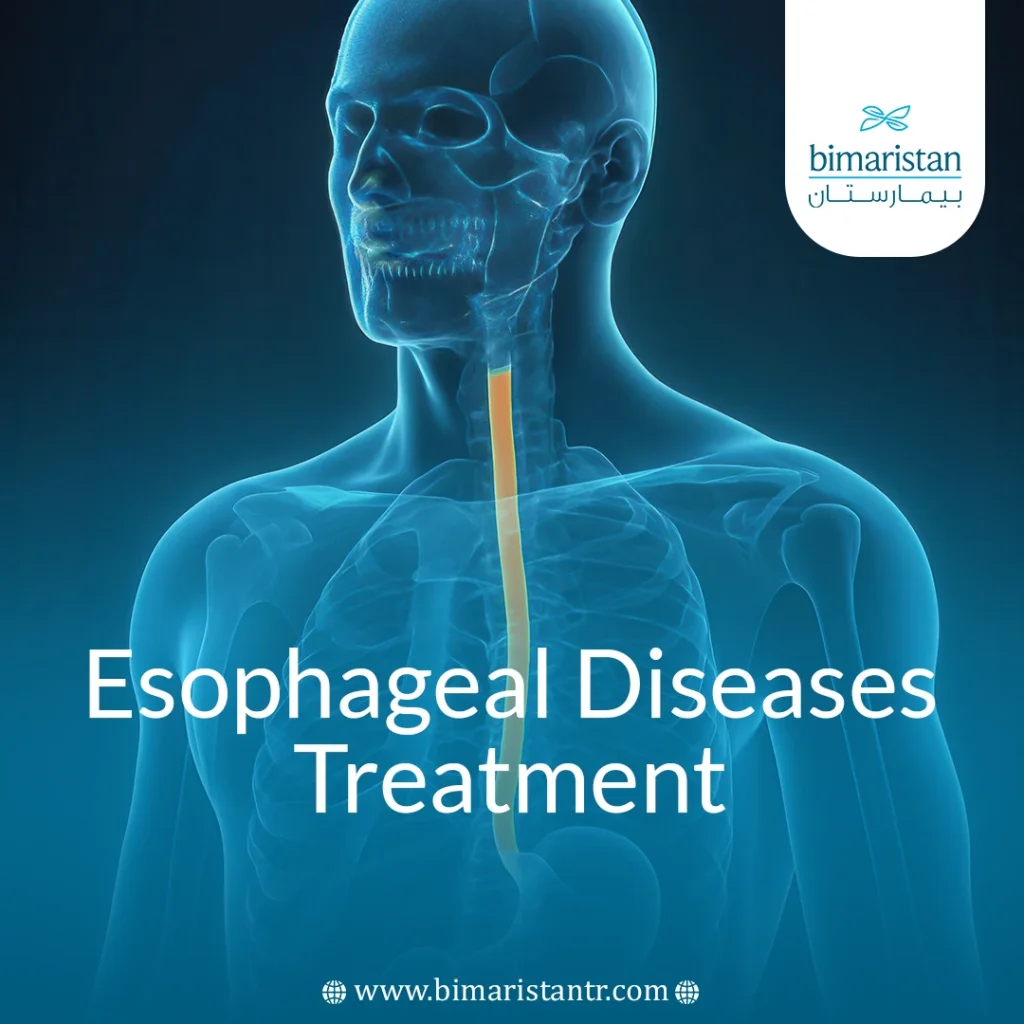Esophageal disease is a common health issue with causes ranging from reflux, inflammation, strictures, and even tumors. Fortunately, there are multiple treatment options available today, including medications, lifestyle changes, and surgical interventions, depending on the severity of the condition. Here’s everything you need to know about esophagus disease treatment, step by step.
What are the most common esophageal diseases that require treatment?
Some of the most common esophageal diseases that require treatment are:
Gastroesophageal reflux disease (GERD)
A chronic disease caused by the reflux of stomach acid into the esophagus, causing heartburn and irritation, it is often treated with medication, but surgery is necessary in cases of drug resistance or complications such as esophageal stenosis (narrowing of the esophagus).

Esophagitis
Esophagitis is caused by reflux, infection, or allergies and is usually treated with medication and dietary changes. Surgery is not performed to treat esophagitis itself, but may be required if there is a structural cause, such as reflux, that is resistant to treatment.
Esophageal stenosis
Narrowing or constriction of the esophagus that causes difficulty swallowing is usually treated with endoscopic dilation of the esophagus. Surgery is required if the narrowing is recurrent or caused by a tumor or severe damage.
Barrett’s esophagus
A condition in which the cells of the esophagus are altered by prolonged exposure to acidity, which increases the risk of cancer and does not require surgery unless it develops into cancer or high-risk cellular abnormalities.
Benign and malignant esophageal tumors
Benign tumors are rare and usually harmless but may require surgical removal if they cause symptoms, while malignant tumors (esophageal cancer) often require resection surgery with chemotherapy or radiation.
GERD treatment: The most common diseases of the esophagus
GERD is one of the most common gastrointestinal diseases, causing heartburn and chest pain, and its treatment relies mainly on medications to reduce acid secretion and relieve symptoms.
GERD medications
- Proton pump inhibitors (PPI): Like omeprazole and lansoprazole, they are an essential and effective treatment to significantly reduce acid secretion in the stomach, allowing the lining of the esophagus to heal and reducing symptoms associated with reflux, although despite their high efficacy, long-term use may lead to decreased absorption of vitamin B12 or increased risk of infectious infection.
- Antacids: Tums and Maalox are used to relieve acute and immediate symptoms by quickly neutralizing the acid in the stomach, but they do not address the underlying causes of the disease, so they are usually combined with other treatments.
- Histamine H₂ blockers: Like famotidine and cimetidine, they reduce acid production for hours and are useful in mild or temporary cases, but are less effective than PPIs for prolonged use.
Lifestyle changes
- Dietary modifications are an important step in esophagus disease treatment, especially in managing GERD symptoms. Patients are advised to avoid fatty and spicy foods, chocolate, caffeine, and carbonated beverages as they increase acid production and irritate the esophagus.
- Delaying sleep for 2-3 hours after eating is essential to prevent acid reflux. Lying down immediately after eating facilitates the movement of acid into the esophagus, which increases inflammation and heartburn.
- Weight loss, especially in obese patients, is a key factor in reducing pressure on the stomach and relieving symptoms significantly in the context of esophagus disease treatment.
When do we resort to surgery?
Laparoscopic Nissen surgery, which treats GERD in drug-resistant cases or complications such as stenosis, strengthens the stomach valve to prevent acid reflux and effectively improves symptoms.
Esophagitis treatment
Esophagitis treatment aims to relieve symptoms, heal the lining of the esophagus, and prevent potential complications by identifying the underlying cause and choosing the right treatment for each case.
Antibiotics or antifungals, when needed
Antibiotics or antifungals are used only when a bacterial or fungal infection is diagnosed in the esophagus. The choice of treatment depends on the type of infection and the doctor’s assessment, with the need to confirm the diagnosis to avoid inappropriate use.
Acidity inhibitors
Proton pump inhibitors or histamine H₂ blockers are given to reduce stomach acidity, which helps soothe the inflammation of the esophageal lining and speed up the healing process.
Modifying medications that irritate the esophagus
Medications that may irritate the esophagus, such as non-steroidal anti-inflammatory drugs (NSAIDs) and some other medications, are reviewed and adjusted or replaced to minimize damage and improve symptoms.
Esophagus disease treatment of esophageal stricture (narrowing of the esophagus and difficulty swallowing).
Treatment for esophageal stricture aims to improve the patient’s ability to swallow and reduce symptoms through esophageal dilation or surgical intervention, depending on the severity of the condition.
Balloon dilation or endoscopy
Esophageal dilation with a balloon or endoscopic dilators is the first procedure to treat esophageal stricture, as it helps open the narrowed section and facilitates the passage of food while relieving swallowing difficulty.
Surgery in advanced cases
Surgery is used only in rare cases when there is an unexpandable tumor or damage.
Preventing restenosis recurrence
Prevention includes controlling underlying causes, such as GERD with acid suppressants, and treating infections or irritations with regular follow-up to minimize the chances of restenosis.
Barrett’s esophagus treatment
Esophagus disease treatment of Barrett’s esophagus aims to minimize the risk of cancerous transformation through pH control, regular monitoring, and treatment of histologic changes when necessary.
Use of proton pump inhibitors
Esophagus disease treatment with proton pump inhibitors (PPIs) is used to reduce gastric acid secretion, which reduces esophageal irritation and limits the development of cell changes associated with Barrett’s esophagus.
Periodic endoscopic evaluation
Periodic evaluation using upper endoscopy with biopsies to monitor histologic changes in the lining of the esophagus is recommended to detect any abnormality at an early stage and prevent the development of cancer.
Radiofrequency ablation in advanced cases
In the case of high-grade dysplasia, radiofrequency ablation (RFA) is used to remove the damaged tissue as a preventive measure to reduce the risk of developing esophageal cancer.
Treatment of benign and malignant esophageal tumors
Esophagus disease treatment of esophageal tumors depends on the type of tumor (benign or malignant), size, and stage to determine the most appropriate strategy to optimize outcomes.
Surgery to remove tumors
Total or partial esophagectomy is used for localized malignancies or large symptomatic benign tumors with the goal of removing the tumor and achieving cure or relief of symptoms.
Chemotherapy or radiation
It is used as an adjunctive esophagus disease treatment before or after surgery or as the main treatment in inoperable cases to help shrink the size of the tumor and prevent it from spreading.
Palliative treatment for advanced cases
It is used to relieve symptoms such as dysphagia or pain in cases of metastatic cancer and includes stenting or limited radiation therapy.
When do you need surgery for esophageal diseases?
Surgical intervention may become necessary in esophagus disease treatment when medical or endoscopic treatments fail to achieve the desired improvement or when serious complications arise.
Cases that do not respond to drug therapy
In cases such as severe GERD or Barrett’s esophagus with high dysfunction, surgery such as Nissen is used to reduce reflux.
A blockage or tumor
Surgical resection is performed for large or cancerous polyps or for stenosis that doesn’t respond to dilation.
Treatment of a large diaphragmatic hernia
A hernia is surgically repaired if it causes chronic symptoms or complications, such as reflux that is resistant to treatment or gastric strangulation.
Can esophageal diseases be treated naturally?
Natural remedies can help relieve some symptoms of esophageal disease, but are not a complete substitute for medical treatment in advanced cases.
The role of herbs in relieving heartburn
Some herbs, such as ginger, may help soothe heartburn, but their effectiveness is limited and should be used with caution and under medical supervision.
The importance of eating fiber
Increased dietary fiber may improve digestion and reduce intra-abdominal pressure, contributing to the relief of GERD symptoms.
When are natural remedies not enough?
In cases such as Barrett’s esophagus, esophageal strictures, or tumors, natural remedies become inadequate and require specialized medical intervention.
Post-treatment: Follow-up and recommendations
Post-treatment care for esophageal diseases is essential to ensure full recovery and minimize the risk of complications or relapse, especially in chronic cases.
The importance of endoscopic follow-up in chronic conditions
In diseases such as Barrett’s esophagus or esophageal stricture, periodic endoscopic examinations are recommended to monitor for histologic changes or recurrence of the stricture.
Diet instructions after esophageal disease treatment or surgery
Patients require a light, easy-to-swallow diet after esophageal disease treatment, avoiding acidic or hard foods, especially after surgeries such as esophagectomy or hiatal hernia repair.
Relapse prevention
Prevention includes adherence to medications, lifestyle modifications, weight control, and avoiding smoking and alcohol to minimize the chances of recurrence of symptoms or complications.
Esophagus disease treatment is varied and available to varying degrees depending on the type and severity of the disease. It is important not to neglect symptoms and to see a gastroenterologist to determine the most appropriate plan for your condition. By following medical and preventive guidelines, symptoms can be eliminated and quality of life can be significantly improved.
Sources:
- U.S. National Library of Medicine. (n.d.). Esophagus disorders. MedlinePlus. Retrieved June 13, 2025
- undhaug, J. E., & Fischer, S. M. (2014). Molecular mechanisms of mouse skin tumor promotion. International Journal of Molecular Sciences, 15(3), 4376-4395.

